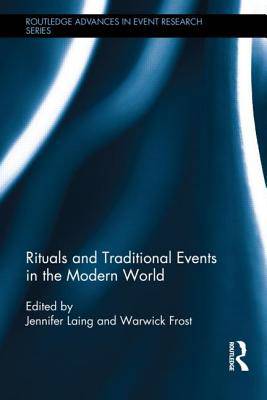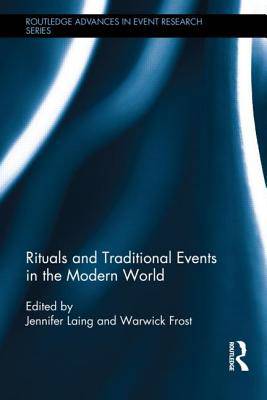
- Afhalen na 1 uur in een winkel met voorraad
- Gratis thuislevering in België vanaf € 30
- Ruim aanbod met 7 miljoen producten
- Afhalen na 1 uur in een winkel met voorraad
- Gratis thuislevering in België vanaf € 30
- Ruim aanbod met 7 miljoen producten
Rituals and Traditional Events in the Modern World
Omschrijving
Many events have evolved over centuries, drawing on local customs and conditions. However, as the world becomes increasingly globalised, traditional events and the identities they support are increasingly being challenged and rituals may be lost. Reacting against this trend towards homogeneity, communities strive to preserve and even recreate their traditional events, which may require rituals to be resurrected or reinvented for a new audience.
The aim of this book is to explore the role of traditional events and rituals in the modern world. The 16 chapters cover a range of case studies of the performance of ritual through events, including their historical antecedents and development over time, as well as their role in society, link with identities both seemingly fixed and fluid and their continued relevance. The cases examined are not museum pieces, but rather vibrant festivals and events that continue to persist. Drawing on the power of history and cultural tradition, they are manifestations of heritage, existing in three temporalities: celebrating the past, occurring in the present and aiming to continue into and influence the future. Iconic events including Chinese New Year, Hogmanay and the New Orleans Mardi Gras are examined and examples are drawn from a diverse range of countries such as South Korea, China, Laos, the United States, Scotland, Italy, India and Haiti.
This volume provides a deep understanding upon the role of tradition and ritual within events, from a global perspective and will be valuable reading for students, researchers and academics interested in events, heritage and culture.
Specificaties
Betrokkenen
- Uitgeverij:
Inhoud
- Aantal bladzijden:
- 248
- Taal:
- Engels
- Reeks:
Eigenschappen
- Productcode (EAN):
- 9780415707367
- Verschijningsdatum:
- 3/11/2014
- Uitvoering:
- Hardcover
- Formaat:
- Genaaid
- Afmetingen:
- 157 mm x 234 mm
- Gewicht:
- 476 g

Alleen bij Standaard Boekhandel
Beoordelingen
We publiceren alleen reviews die voldoen aan de voorwaarden voor reviews. Bekijk onze voorwaarden voor reviews.










